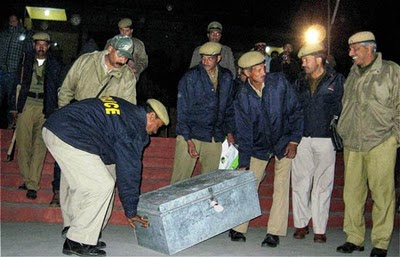Seeking Asylum for the Seventeenth Karmapa
This past Friday, armed police entered the monastic residence of the twenty-six year old Seventeenth Gyalwa Karmapa, conducted a warrantless search of his person and premises, and seized all of the currency they could find -- reportedly an amount greater than three-quarters of a million dollars. After calling for the media, officers made a show of removing the currency in a tin trunk, amid sarcastic comments and laughter.
Almost simultaneously, the Karmapa's confidential medical records -- held in government custody -- were found to be mysteriously missing.
Immediately thereafter, members of Karmapa's family, his staff, and their family members were rounded up, and their homes searched. Karmapa's own sister was subjected to hours of hostile interrogation. Two staff members were arrested. More currency was seized.
A series of press releases and statements were issued by the Himachal Pradesh state government to the effect that Karmapa was potentially a "Chinese agent," and that he was "deliberately misleading" investigators. Himachal Pradesh's Chief Minister -- the equivalent of a state governor -- claimed that the matter threatened the "internal security of the state." After public opinion was well and truly inflamed, an official statement was issued explaining that the Karmapa's twenty-four man security detachment had been withdrawn, and his personal security was now provided by a single, lowly police constable.
The Seventeenth Karmapa is now under house arrest. He is not now, nor has he been for several months, free! to leav e India and perform the duties of his religious office.
The current training materials for United States Asylum Officers identify seven areas that the officer must examine when making the discretionary grant of asylum in the name of the Secretary of the Department of Homeland Security, or the Attorney General. These seven areas devolve into a three part decision chain:
- Does the applicant meet the statutory definition of refugee?
- Is the applicant subject to any mandatory bar?
- If the applicant meets the statutory definition of refugee, and there is no mandatory bar, should discretion be exercised?
The seven areas considered are:
- Basic definition of "refugee."
- Determining country or nationality or, if stateless, country of last habitual residence.
- If the applicant is unable or unwilling to return.
- If the applicant is unable or unwilling to avail oneself of protection.
- Persecution, with special emphasis on whether the harm involved amounts to persecution.
- Identifying the persecutor.
- Eligibility based on past persecution.
There are also other important factors to be considered, such as the fundamental "well-founded fear" standard of eligibility based on fear of future persecution, motives of the persecutor, the five protected characteristics in the refugee definition, the burden of proof and standards of evidence, and mandatory reasons to deny asylum.
The Seventeenth Karmapa is a stateless political refugee from Tibet. He is unable to return to Tibet because of a well-founded fear of persecution arising from his internationally publicized escape from Chinese Communist religious oppression. There are no means of protection available to him should he return to Tibet.
His country of first asylum, and his habitual residence since escaping Tibet, is India.
However, since being granted asylum in India! , he has been subjected to a progressively escalating campaign resulting in the events described above.
- His movements are strictly controlled.
- He has been repeatedly denied requests to practice his religion by meeting with Dalai Lama, or returning to his predecessor's seat at Rumtek.
- He has been repeatedly denied requests to perform the functions of his office as the Karmapa by traveling to his followers in foreign countries.
- He has been publicly branded a "threat" by members of the host government.
- His basic human rights have been violated.
- He has been subjected to discrimination and harassment.
- Members of his family and entourage have been subjected to arrest and/or detention by virtue of their association with him.
- He has been subjected to economic harm.
- He has been subjected to psychological harm.
If the Karmapa attempts to avail himself of legal protection, given the vagaries of Indian law as applied to stateless persons, it is likely that the above acts of persecution would not be curtailed; rather, since they are being perpetrated by agents of the state, it is more likely than not such acts would intensify.
Indeed, there is a well-founded fear that these acts will continue, and escalate even more, regardless of any attempts the Karmapa may or may not take to protect himself, his family members, and his staff.
The Karmapa is an apolitical religious leader of world stature, with many thousands of followers. He leads an exemplary life. There is no mandatory bar to the exercise of discretionary asylum in his case.
The central government of India has found itself unwilling or unable to protect the Karmapa from the acts of persecution he has experienced, and must be deemed complicit in such acts. Facts supporting this claim of complicity are extreme measures undertaken by Indian national security agencies, such as forced medical examinat! ions to "prove his age," and repeated interrogations without benefit of legal protection.
The disgraceful violation of a Tibetan Buddhist monastery by armed thugs, acting to oppress the legitimate aspirations of His Holiness the Gyalwa Karmapa under color of authority, shocks the conscience of all freedom-loving people throughout the world.
The persecution of the Karmapa must end, and he must be afforded a place of safety.
If this cannot be accomplished by prior means, it most certainly can be accomplished by other means.
.
Write to rinpoche2006@gmail.com http://tibetanaltar.blogspot.com
